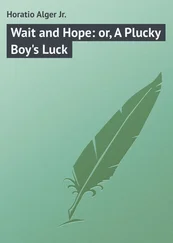Horatio Alger - Andy Grant's Pluck
Здесь есть возможность читать онлайн «Horatio Alger - Andy Grant's Pluck» — ознакомительный отрывок электронной книги совершенно бесплатно, а после прочтения отрывка купить полную версию. В некоторых случаях можно слушать аудио, скачать через торрент в формате fb2 и присутствует краткое содержание. Издательство: Иностранный паблик, Жанр: foreign_children, literature_19, foreign_antique, foreign_prose, на английском языке. Описание произведения, (предисловие) а так же отзывы посетителей доступны на портале библиотеки ЛибКат.
- Название:Andy Grant's Pluck
- Автор:
- Издательство:Иностранный паблик
- Жанр:
- Год:неизвестен
- ISBN:нет данных
- Рейтинг книги:3 / 5. Голосов: 1
-
Избранное:Добавить в избранное
- Отзывы:
-
Ваша оценка:
- 60
- 1
- 2
- 3
- 4
- 5
Andy Grant's Pluck: краткое содержание, описание и аннотация
Предлагаем к чтению аннотацию, описание, краткое содержание или предисловие (зависит от того, что написал сам автор книги «Andy Grant's Pluck»). Если вы не нашли необходимую информацию о книге — напишите в комментариях, мы постараемся отыскать её.
Andy Grant's Pluck — читать онлайн ознакомительный отрывок
Ниже представлен текст книги, разбитый по страницам. Система сохранения места последней прочитанной страницы, позволяет с удобством читать онлайн бесплатно книгу «Andy Grant's Pluck», без необходимости каждый раз заново искать на чём Вы остановились. Поставьте закладку, и сможете в любой момент перейти на страницу, на которой закончили чтение.
Интервал:
Закладка:
Somehow, Andy felt more and more sorry to think his father must be indebted to such a man.
"It is getting quite fallish," said the squire, rubbing his hands. "I suppose I am more sensitive to cold, as my home is heated throughout with steam."
"I hope we shall be able to make you comfortable, Squire Carter," returned Mrs. Grant, who had entered the room in time to hear this last speech.
"Oh, yes, Mrs. Grant. I always adapt myself to circumstances."
"That is very kind in you," Andy was tempted to say, but he forbore. It would not do to offend the village magnate.
"I see you have sent for Andrew," observed the squire, with a wave of his hand toward the boy.
"Yes; I shall not be able to keep him at Penhurst Academy any longer."
"Very sensible decision of yours. No doubt it cost you a pretty penny to keep him there?"
"The school charge is three hundred dollars a year."
"Bless my soul! How extravagant! You will excuse my saying so, but I think you have been very unwise. It really seems like a wasteful use of money."
"Don't you believe in education, squire?" asked Mrs. Grant.
"Yes; but why couldn't he get all the education he needs here?"
"Because there is no one here who teaches Latin and Greek."
"And what good would Latin and Greek do him? I don't know anything of
Latin and Greek, and yet I flatter myself I have succeeded pretty well.
I believe I am looked up to in the village, eh?"
"No doubt you occupy a prominent position, squire, but the boy had a fancy for the languages and wanted to go to college."
"I shall not send my son to college, though, of course, I can afford it."
"Perhaps he doesn't care to go."
"No the boy is sensible. He will be satisfied with the advantages his father enjoyed. Supposing your boy had gone to college, what would you have made of him?"
"He thought he would have liked to prepare himself for a teacher or professor."
"It's a poor business, Neighbor Grant. A schoolmate of mine became a teacher—the teacher of an academy—and I give you my word, he's as poor as poverty."
"Money isn't everything, squire."
"It's a good deal, as in your present circumstances you must admit. But we may as well come to business."
CHAPTER III.
ANDY LEAVES THE ACADEMY
"You need to raise three thousand dollars, I believe, Neighbor Grant?" began the squire.
"Yes, squire."
"Three thousand dollars is a good deal of money."
"I realize that," said Mr. Grant, sadly.
"I was about to say it is a good deal to raise on the security of the farm."
"The farm cost me six thousand dollars."
"It would fetch only five thousand now. It wouldn't fetch that at a forced sale."
"But for my losses, I wouldn't consider an offer of less than six thousand."
"Of course, you are attached to it, and that gives it a fancy value in your eyes."
"It is good land and productive. Then, it is well situated, and the buildings are good."
"Well, tolerable," said the squire, cautiously. "However, that's neither here nor there. You want three thousand dollars, and I have agreed to let you have it. I will take a mortgage for two years, the interest being, as usual, six per cent."
"Two years?" repeated Farmer Grant, uneasily.
"Yes. I am not sure that I can spare the money longer than two years. I give you that time to pay it off."
"But it will be impossible for me to pay it off in two years. In fact, it will take all my income to live and pay the interest."
"Of course that isn't my lookout."
"Do you mean that you will foreclose in two years?"
"Not necessarily. I may not need the money so soon. Besides, you may find some one else to take it off my hands."
"Can't you say five years, squire?" pleaded the farmer.
Squire Carter shook his head.
"No; you can take it or leave it. I am not at all anxious to take the mortgage, and if my terms are not agreeable, we will consider the negotiations at an end."
"I won't make any difficulty, squire; I accept your terms."
"That is sensible. I can't, for my part, see how five years would have been more favorable to you than two."
"My son Andrew is sixteen. By the time he is twenty-one he might help me."
"There's not much chance of that—unless he marries a fortune," said the squire, jocosely. "I suppose you will keep him at home to help you on the farm?"
"We haven't talked the matter over yet. I will consult his wishes as far as I can. He can't earn much money on the farm. What are you going to do with your son?"
"Conrad will probably be a merchant, or a banker," said the squire, pompously.
"With your means you can select any path in life for him."
"True; as my son he will have a great advantage. Well, as our business is arranged, I will leave you. If you will call at Lawyer Tower's office to-morrow at noon the papers can be drawn up, and I will give you a check for the money."
"Thank you, squire. I will meet the appointment."
"If you don't want Andrew to work on the farm I will turn over his case in my mind and see if I can get him a position."
"Thank you. I should be glad to have him well started in some business where he can raise himself."
As the term of the academy was so nearly completed, Andy went back with his father's permission, to remain till vacation. He sought an interview at once with Dr. Crabb, the principal, and informed him of the necessity he was under of leaving the institution.
"I am really sorry, Andrew," said the doctor. "You are one of my best pupils. I am not sure but the best. There is scarcely one that I would not sooner lose. I shall be willing to take you for half price—that is, for one hundred and fifty dollars—till you are ready for college."
"Thank you, Dr. Crabb," replied Andy, gratefully. "You are very kind, but even that sum my father, in his changed circumstances, would be unable to pay. Besides, it would be quite out of my power to go to college even if I were prepared."
"It is a thousand pities," said the principal, with concern. "If you must leave, you must. I am not sure but I should be willing to take you gratuitously."
"Thank you; but I feel that I ought to go to work at once to help my father. It is not enough that I free him from expense."
"No doubt you are right. I respect you for your determination. You need not hesitate to apply to me at any time in the future if you see any way in which I can be of service to you."
"I think it will help me if you will give me a letter of recommendation, which I can show to any one from whom I seek employment."
"I will give you such a letter with great pleasure;" and the doctor, sitting down at his desk, wrote a first-class recommendation of his favorite pupil.
There was general regret in the academy when it was learned that Andy must leave them. One little boy of twelve—Dudley Cameron, a special favorite of Andy—came to him to ask if there was no way by which he could manage to stay.
"No, Dudley! I am too poor," said Andy.
"If I write to papa and ask him to send you a thousand dollars, will you stay?" asked the little boy, earnestly.
"No, Dudley; you mustn't do anything of the kind. Even if your father liked me as well as you do, and would give me the money, I could not take it. I must go to work to help my father."
"You will write to me sometimes, Andy?"
"Yes; I will be sure to do that."
The little fellow's warm-hearted offer, and the expressions of sympathy and regret on the part of his schoolmates, cheered Andy. It was pleasant to think that he would be missed.
On the closing day he received the first prize for scholarship from the hands of Dr. Crabb.
"You will take my best wishes with you, Andy," said the venerable principal. "Let me hear from you when you have made any business arrangement."
Читать дальшеИнтервал:
Закладка:
Похожие книги на «Andy Grant's Pluck»
Представляем Вашему вниманию похожие книги на «Andy Grant's Pluck» списком для выбора. Мы отобрали схожую по названию и смыслу литературу в надежде предоставить читателям больше вариантов отыскать новые, интересные, ещё непрочитанные произведения.
Обсуждение, отзывы о книге «Andy Grant's Pluck» и просто собственные мнения читателей. Оставьте ваши комментарии, напишите, что Вы думаете о произведении, его смысле или главных героях. Укажите что конкретно понравилось, а что нет, и почему Вы так считаете.












